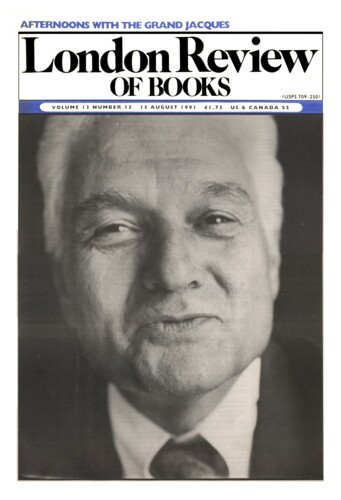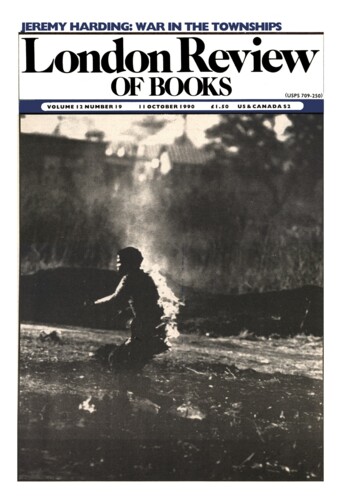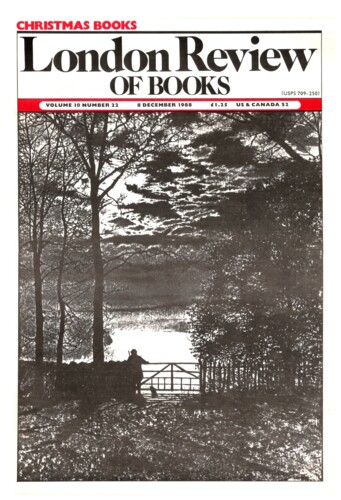Jonathan Bate
Jonathan Bate is a research fellow of St Catharine’s College, Cambridge.
Distaste for Leavis
11 October 1990
Barking up Wordsworth’s tree
8 December 1988
Pieces about Jonathan Bate in the LRB
Don’t break that fiddle: Eclectic Imitators
Tobias Gregory, 19 November 2020
The boundary between the broader and narrower senses has never been firm, and the history of literary imitation has always been bound up with the histories of philosophy, rhetoric and education. Plato,...
After-Meditation: The Girondin Wordsworth
Thomas Keymer, 18 June 2020
In 1801, Wordsworth congratulated a reader of Lyrical Ballads for identifying the pathos of the poems as ‘the pathos of humanity’ and not ‘jacobinal pathos’; only ‘bad poets and misguided men’,...
Sorrows of a Polygamist: Ted Hughes in His Cage
Mark Ford, 17 March 2016
So much in the life and work of Ted Hughes was weird and transgressive that even now, 18 years after his death, it is hard to assess his actions and literary achievement.
For his Nose was as sharpe as a Pen, and a Table of greene fields: The Yellow Shakespeare
Michael Dobson, 10 May 2007
In a glass case in the garret of a house just off Fleet Street, a historic publishing contract has just gone on display.* It only takes up one piece of paper, rather smaller than a sheet of A4,...
Gentlemen and ladies came to see the poet’s cottage: Clare’s anti-pastoral
Tom Paulin, 19 February 2004
In 1865, a year after John Clare’s death in the Northampton General Lunatic Asylum, Frederick Martin, a former amanuensis of Thomas Carlyle, published the first biography of the...
Gobsmacked: Shakespeare
Michael Dobson, 16 July 1998
‘Soul of the age!’ exclaimed Ben Jonson in the prefatory pages of the First Folio (1616), ‘The applause, delight, the wonder of our stage!’ His climactic description was...
A Kind of Scandal
A.D. Nuttall, 19 August 1993
Ovid was Shakespeare’s favourite poet. The fact is central to his genius, crucial to the understanding of his work. Shakespeare himself remains visible to posterity; Ovid is now, through...
Constable’s Plenty
John Barrell, 15 August 1991
The catalogue of the Constable exhibition which opened at the Tate in June is probably the glossiest, the heaviest, the most unwieldy volume ever to accompany an exhibition of the work of a...
Hazlitteering
John Bayley, 22 March 1990
Hazlitt has a modern feel about him. Among the poets of his age, dying young or turning, like Wordsworth, into pillars of the establishment, he represents a kind of muddling through, an honesty...
Read anywhere with the London Review of Books app, available now from the App Store for Apple devices, Google Play for Android devices and Amazon for your Kindle Fire.
Sign up to our newsletter
For highlights from the latest issue, our archive and the blog, as well as news, events and exclusive promotions.



